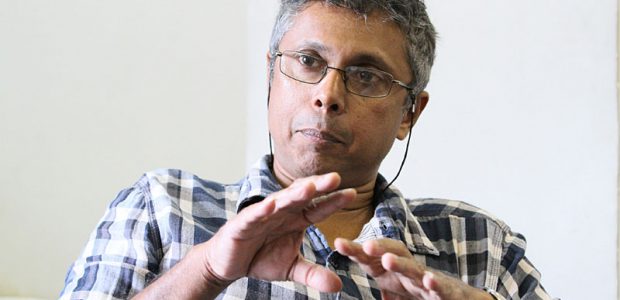Interview + Nirmal Ranjith Dewasiri:
Politicians Do What They Like, Civil Society Is Trapped
In a hard-hitting interview, Sri Lankan historian and activist Nirmal Ranjith Dewasiri tells The Catamaran why promises for reconciliation are empty and civil society groups are useless.
The country is at an impasse says Sri Lankan historian and political activist Nirmal Ranjith Dewasiri. Talk of reconciliation in the country is useless, he says, because neither the Sinhalese or Tamil politicians can reach any kind of compromise. In the meantime, empty promises of action keep civil society and other groups busy but achieve virtually nothing, while politicians do as they please on various infrastructure projects, Dewasiri says in a hard hitting interview with The Catamaran.
The Catamaran: As always in Sri Lanka there is a lot of talk about reconciliation. What is your opinion on the progress of local reconciliation?
Dewasiri: It is not easy to achieve reconciliation. The basic nature of reconciliation would be to have the Sinhala and Tamil communities reaching consensus on the political system in Sri Lanka as well as on how that political model can be restructured.
But there are opposing political views in this country. In the north, the Tamil view and in the south, the Sinhala Buddhist point of view. These opinions are mutually exclusive. Anyone who opposes those points of view has to face consequences. They will find it very hard to get votes.
Those in the south talk about a single, centralized state whereas those in the north want a federal system. There is no coexistence or reconciliation between the two.
If good things have happened it is not because the government has made them happen.
This is the first thing we need to acknowledge when we talk about reconciliation. We have to work out how to overcome this impasse. We need to think strategically about this and up until now, that isn’t happening. That’s why I don’t feel positive about this project called reconciliation. I still take part in various projects related to this and I don’t think we should just do nothing about it. But we should look into the impact of what we do.
The Catamaran: The Tamil National Alliance, one of the most representative parties for Tamil Sri Lankans in the north of the country, has expressed approval of an amendment to the Sri Lankan Constitution. This amendment is supposed to create provincial councils in the country and devolve political powers from Colombo to the Tamil politicians in the north and the east. Don’t you feel this is a positive step?
Dewasiri: I don’t accept that. I don’t think that a federal or a centralized government can provide the answer to Sri Lanka’s problems. Although the TNA and Tamil society has approved of a 13th point in the Constitution, the Sinhalese do not accept it. Up north they say “13 plus”, in the south they say “13 minus”.
The Catamaran: So can this government last?
Dewasiri: A tug of war is developing between the Prime Minister’s group and the President’s. It is impossible to say which way this will develop. It is an unusual situation.
The Catamaran: So you don’t think there is any actual real consensus between the two leaders?
Dewasiri: There is no consensus. Whatever there is, is superficial because there are major differences of opinion between the two leaders. However it is in both of their interests to maintain an alliance; they need to.
The Catamaran: Critics of the Sri Lankan government say a lot against the country’s political leadership – such as, that legislation is only used against political enemies, that criminals and corrupt officials are being protected. They say there is no good governance in Sri Lanka.
Dewasiri: If good things have happened it is not because the government has made them happen. For example, freedom of expression and democratic space have both increased. But that did not happen because the government made it happen. It is a situation that came about because of change in the country.
The Catamaran: For years now Sri Lankan politicians have been promising to abolish the executive presidency; many voters hate it as they see it as undemocratic.
Dewasiri: There is a widespread desire in the country to abolish the presidency. People are interpreting this the way they want. I think the government will try and centralize power in a different way. So I think we need other action as well, in order to eliminate the danger of all the power in one super-ministry.
When we discussed education in Sri Lanka it was agreed that 6 percent of gross domestic product should go into education. Without really thinking about it many politicians simply took that slogan and ran with it. They didn’t really think about what it entailed. The same is true of the slogans about abolishing the executive presidency.
We need to work to make our society more politically enlightened.
Personally I think the time has passed for certain changes, such as those that could be achieved with constitutional amendments. Powerful persons in government give the idea of constitutional amendments to civil society organisations and they chew it on as though it is a piece of gum. Meantime the government is busy doing other things. The politicians do what they like in places like Hambantota [where major infrastructure projects are mired in debt and controversy] and with the Megapolis [a plan to develop the country’s western region].
Then the civil society organisations are left saying: At least if we make a good constitution, then that will be enough. And they tolerate other activities. That is a trap and the civil society organisations are tangled up in it.
/










